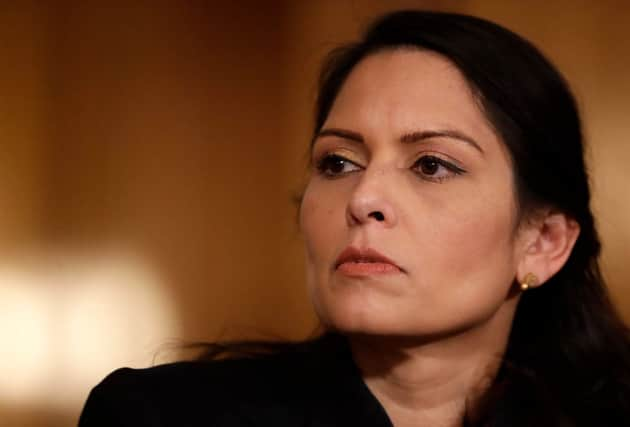MPs debated the controversial proposed policing bill for hours yesterday - here’s what happened


MPs spent several hours yesterday (15 Mar) debating the Government’s proposed Police, Crime, Sentencing and Courts Bill, which ministers say is about increasing sentences for specific types of violent crime, while critics argue it fundamentally undermines the right to protest.
The bill will increase the maximum sentences available for a number of offences, but will also give police wide ranging powers to prevent protest and prosecute those who take part in them.
Advertisement
Hide AdAdvertisement
Hide AdIt was introduced by Home Secretary Priti Patel who focussed on the elements of the bill which increase maximum sentences for assaults on emergency workers from 12 months to two years.
However the Government has faced criticism over the detail of the bill, which places more focus on attacks on statues or monuments than violence toward women, and allows the possibility for a rapist to face five years in prison while someone who vandalises a statue could face 10.
‘The right to protest’
Ms Patel said that recent changes in protest tactics mean that existing protest laws need to be changed, meaning police need further powers to prevent noisy protests that cause significant disruption.
She said: “This Bill will give police the powers to take a more proactive approach in tackling dangerous and disruptive protest. The threshold at which the police can impose conditions on the use of noise at a protest is rightfully high”.
Advertisement
Hide AdAdvertisement
Hide AdLabour’s shadow home secretary Nick Thomas-Symonds said that Labour will vote against the bill in its current form, over concerns about the protest provisions within it, and said that the Government “seeks to attack” the right to protest.
He said: “Our existing laws on protest strike a careful balance between legitimate rights and the need to keep order.
“What our laws on protest do not do, and should never do, is seek to shield those in power from public criticism and public protest.”
He added: “We on these benches will oppose a Bill that puts at risk the whole right to protest, hard won by previous generations, that is part of the fabric of British democracy”.
‘Potential unintended consequences’
Advertisement
Hide AdAdvertisement
Hide AdTheresa May and Fiona Bruce were among the only Conservative MPs to speak critically about aspects of the bill.
Former Prime Minister Thersa May said that while she sees “the reason for bringing forward” the bill, she raised concerns about the elements of the bill relating to protest, saying it could have “potential unintended consequences”.
“Freedom of speech is an important right in our democracy, however annoying or uncomfortable sometimes that might be,” she said.
A former Home Secretary herself, Ms May addressed aspects of the bill which grant the head of the Home Office powers to unilaterally alter the legislation once it is brought in.
Advertisement
Hide AdAdvertisement
Hide AdShe said: “It’s tempting with the Home Secretary to think that giving powers to the Home Secretary is very reasonable because we all think we’re reasonable, but actually future Home Secretaries may not be so reasonable.”
‘Racist and draconian proposals’
Justice spokesperson for the SNP, Anne McLaughlin, criticised aspects of the bill which seek to clamp down on “unauthorised” Traveller camps by creating a new offence.
A consultation which took place on this aspect of the legislation last year found that most police forces in England did not need the proposed new powers to tackle issues with unauthorised camps.
Ms McLaughlin said that Gypsies and Travellers are among “the most persecuted and most misunderstood” groups in the UK, while Labour MP for Hammersmith, Andy Slaughter, said the Home Secretary would be “advised to drop these racist and draconian proposals from the Bill before it progresses any further”.
‘Make misogyny a hate crime’
Advertisement
Hide AdAdvertisement
Hide AdLabour MP for Rotheram, Sarah Champion, called on ministers to make misogyny a hate crime, and welcomed some aspects of the bill.
She said: “Crimes against women often specifically occur because they are women. These crimes are not gender neutral and so the law should not be either. The definition must be considered about making misogyny a hate crime.”
Conservative MP for South Northamptonshire, Andrea Leadsom, said she’s received email in the last few days “calling for curfew on men, and others calling for greater understanding that not all men are perpetrators”.
She said: “At such a difficult time, we must find the right balance between personal freedom and state intervention, but also recognise how vital it is that we teach our boys and our girls the profound importance of mutual respect”.